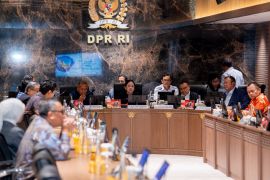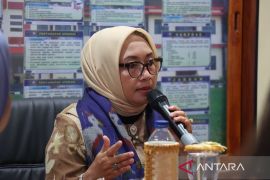"These regulations are intended to facilitate local administrations in issuing local bonds, strengthen the implementation of sustainable finance, and speed up the service process for stakeholders," FSA`s chairman Wimboh Santoso said here on Friday.
In relation to local bonds, the FSA will issue three regulations, namely, Regulation Number 61/POJK.04/2017 on Documents of Registration in the Framework of Public Offering for Local Bonds and/or Islamic Bonds, Regulation No. 62/POJK.04/2017 on the Form and Contents of Prospectus and Prospectus for Public Offering of Local Bonds and/or Islamic Bonds, and Regulation No. 6/POJK.04 / 2017 on the Report and Announcement of Local Bonds and/or Islamic Bonds Issuer.
Wimboh explained that regulations on local bonds and/or Islamic bonds are an effort to support the government`s priority program in increasing infrastructure developments.
These projects are not only the basis of national competitiveness improvement but also a way to realize equal distribution of economic growth among all Indonesians. Therefore, the infrastructure development projects should be supported by adequate funding sources.
"The three regulations on local bonds and/or Islamic bonds are aimed at increasing the source of infrastructure development financing other than from the Regional Budget (APBD). The financial sources can be from capital markets through the issuance of local bonds and/or Islamic bonds," Wimboh noted.
Through the expansion of APBD, Wimboh remarked, the infrastructure development projects can be accelerated so that economic growth and equity in people`s welfare can be immediately realized.
In the process of issuing local bonds and/or Islamic bonds, local administrations should submit a Registration Statement to the FSA and obtain approval from the Ministry of Finance, the Ministry of Home Affairs, and the Regional House of Representatives .
Wimboh said the quantum of local budgets is a concern. This is because the investors` confidence is highly dependent on how local administrations manage their budget and utilize local bonds and/or Islamic bonds.
"Therefore, we hope that local administrations can improve local human resources and organizational infrastructure to manage the local bonds and/or Islamic bonds. This is not only important when the funds from local bonds and/or Islamic bonds are available, but also to maintain sustainable debt servicing and investor relations," Wimboh asserted.
Meanwhile, regarding green bonds, the FSA issued Regulation No.60/POJK.04/2017 on the Issuance and Requirements of Green Bonds. The regulation is in line with the long-term development plan to achieve a sustainable Indonesia through, among other things, utilization of natural resources and environment.
"The regulation is expected to become one of the most environmentally friendly sustainable financing alternatives in the capital markets. The issuance of green bonds by Indonesian firms in the capital markets will certainly be a significant milestone to affirm Indonesia`s commitment in addressing environmental issues through environmentally friendly financial products" he claimed.
Regarding e-registration, the FSA issued Regulation No. 58/POJK.04/2017 on the Submission of Registration Statements or the Electronic Corporation Registration Procedures. The regulation was issued so that the FSA`s services become more efficient and transparent by utilizing information technology. For its implementation, the FSA has set up an electronic system called the Integrated Licensing and Registration System (SPRINT).
In addition to issuing these regulations, the FSA also initiated several policies to deepen the capital markets in Indonesia. These policies aim to reduce market risks, increase market liquidity, and accommodate changes in regional practices.
The FSA, together with the Indonesia Stock Exchange, and two other companies engaged in the stock exchanges of PT KSEI (Kustodian Sentral Efek Indonesia) and PT KPEI (Kliring Penjaminan Efek Indonesia) have accelerated the transaction exchange settlement (T) program from T+3 to T+2.
This program is carried out with the support of Straight Through Processing, Single Investor Identification, and Customer Fund Account that allows quicker processing of funds and securities allocation at the exchange.
The implementation of the T+2 settlement cycle provides benefits to the industry by increasing harmonization among global exchanges that facilitate securities transactions across stock markets and/or countries, increases liquidity through capital reinvestment acceleration, improves operational efficiency, and reduces systemic risks that can occur in capital markets. In order to realize these benefits, the FSA, self- regulatory organizations (SRO), exchange members, custodian banks, and other actors need to adjust to existing business rules, systems and processes to accommodate the T+2 completion cycle.
Currently, the FSA is researching the local securities companies. The study is motivated by the limited access of local investors to invest in capital market products, and the less optimal network marketing infrastructure in other locations and agencies.
The establishment of local securities firms is expected to increase the involvement of financial and professional services institutions at the local level in an effort to increase investor base and job opportunities in the local region.
"The development of local securities companies can replicate the establishment of Rural Banks that are able to reach customers who cannot be served by commercial banks," Wimboh stressed.
The business scope of local securities firms is among others securities brokerage services, and mutual funds selling. To ensure the sustainability of these local securities firms, infrastructure development support from the FSA and SROs is required.
(KR-LWA/INE/B003)
Edited by INE
(T.SYS/B/KR-BSR/B003)
Reporter: antara
Editor: Heru Purwanto
Copyright © ANTARA 2017












